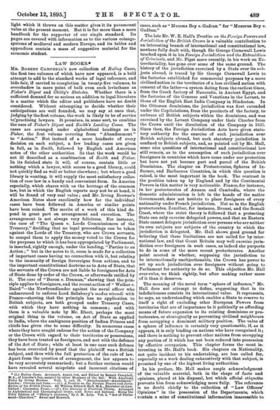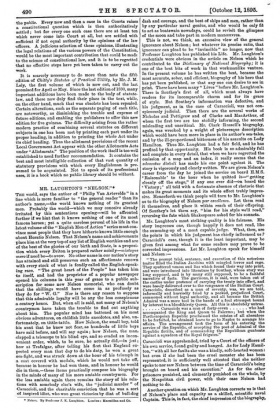LAW BOOKS.*
MR. ROBERT CAMPBELL'S new collection of Ruling Cases, the first two volumes of which have now appeared, is a bold attempt to add to the standard works of legal reference, and bids fair, if carried to completion in twenty-five volumes, to overshadow in mere point of bulk even such leviathans as Fisher's Digest and Chitty 's Statutes. Whether there is a sufficient demand for so serious an addition to legal literature is a matter which the editor and publishers have no doubt considered. Without attempting to decide whether their anticipations are well founded, we may say at once that, judging by the first volume, the work is likely to be of service to:practising lawyers. It promises, in some sort, to combine the uses of Fisher's Digest and Smith's Leading Cases. The cases are arranged under alphabetical headings as in Esher, the first volume covering from " Abandonment " to "Action." But instead of a mere headnote of every decision on each subject, a few leading cases are given in full, as in Smith, followed by English and American notes of the other authorities. So that the work would be not ill described as a combination of Smith and Fisher. In its finished state it will, of course, contain little or nothing which a lawyer, with access to a good library, could not quickly find as well or better elsewhere ; but where a good library is wanting, it will supply the most satisfactory collec- tion of case law in a handy and convenient form. In America especially, which shares with us the heritage of the common law, but in which the English reports may not be at hand, it will be found of very real value ; and Mr. Irving Browne's American Notes show excellently how far the individual cases have been followed in America or similar points have been raised. The merits of a work of this kind de- pend in great part on arrangement and execution. The arrangement is not always very felicitous. For instance, the case of "The Queen v. Lords Commissioners of the Treasury," deciding that no legal proceedings can be taken against the Lords of the Treasury, who are Crown servants, to compel them to apply the money voted to the Crown for the purposes to which it has been appropriated by Parliament, is inserted, rightly enough, under the heading, "Parties to an Action ; " but in the notes to it, room is made for a collection of important cases having no connection with it, but relating to the immunity of foreign Sovereigns from actions, and to the important constitutional doctrine as to Acts of State, that the servants of the Crown are not liable to foreigners for Acts of State done by order of the Crown, or afterwards ratified by it. The case of "Baron v. Denman," showing that the prin- ciple applies to foreigners, and the recent action of " Walker v. Baird "—the Newfoundlander against the naval officer who endeavoured to enforce Lord Salisbury's modus vivendi with France—showing that the principle has no application to British subjects, are both grouped under Treasury Cases, with which they have nothing in common ; and with them is a valuable note by Mr. Ebert, perhaps the most original thing in the volume, on Act of State as applied to India, where the ambiguous position of Indian Princes and chiefs has given rise to some difficulty. In numerous cases where they have sought redress for the action of the Company or the Crown with regard to their territories or possessions, they have been treated as foreigners, and met with the defence of the Act of State ; while at least in one case such defence has been overruled by proof that the plaintiff was a British
subject, and thus with the full protection of the rule of law. Apart from the question of arrangement, the law appears to be very accurately summarised ; but a further revision would have revealed several misprints and incorrect citations of
• (I.) Ruling Cases. Arranged, Annot,ted, and Edited by Robert Campbell, M.A.. of Lincoln's Inn, assiste I by other Members of the Bar. With American Notes by Irving Browne. Vols. I. and IL " Abandonment—Amendment." London: Stevens and Sons.—(2.) A Treatise on the Foreign Powers and Juris- diction of the British Crown. By William Edward Hall, M.A., Barrister-at-Law. Oxford Clarendon Press.-13 ) The Statutes of Practical Utility. Arranged in Alphabetical and Chronological Order, with Notes and Indexes. Being the Fifth Edition of "Chitty's tatutes," by J. M. Lely. Vol. L "Act of Parlia- ment—Charities." Sweet and Ida...well.
cases, such as " Mamma Bey v. Gadran " for " Mnsurus Bey v. Gadban."
The late Mr. W. E. Hall's Treatise on the Foreign Powers and Jurisdiction of the British Crown is a valuable contribution to an interesting branch of international and constitutional law, nowhere fully dealt with, though Sir George Cornewall Lewis touched upon it in his Foreign Jurisdiction and the Extradition, of Criminals, and Mr. Pigot more recently, in his work on Ex- territoriality, has gone over some of the same ground. The history of the jurisdiction exercised by a State over its sub- jects abroad, is traced by Sir George Cornewall Lewis to the factories established for commercial purposes by a more civilised nation in the territories of a less civilised nation with consent of the latter—a system dating from the earliest times, from the Greek factory of Naucratis, in Ancient Egypt, and the factories of the Genoese and Venetians in the Levant, to those of the English East India Company in Hindostan. In the Ottoman dominions, the jurisdiction was first extended under the Capitulations, from the precincts of the factory, to embrace all British subjects within the dominions, and was exercised by the Levant Company under their Charter from the Crown until the dissolution of the Company in 18.25. Since then, the Foreign Jurisdiction Acts have given statu- tory authority for the exercise of such jurisdiction over British subjects abroad, but such statutory jurisdiction is confined to British subjects, and, as pointed out by Mr. Hall, some nice questions of international and constitutional law still remain, as to the assumption of such jurisdiction over foreigners in countries which have come under our protection but have not yet become part and parcel of the British Dominions. The chapter on Protectorates, Spheres of In- fluence, and Barbarous Countries, in which this question is raised, is the most important in the book. The contrast in the position taken up by England and by the Continental Powers in this matter is very noticeable. France, for instance, in her protectorates of Annam and Cambodia, where the domestic administration is left in the hands of the native Government, does not hesitate to place foreigners of every nationality under French jurisdiction. Not so in the English protectorates, Zanzibar, for instance, Brunei, and the Somali Coast, where the strict theory is followed that a protecting State can only exercise delegated powers, and that an Eastern State cannot delegate jurisdiction over persons who are neither its own subjects nor subjects of the country to which the jurisdiction is delegated. Mr. Hall shows good ground for believing that these limitations are not called for by inter- national law, and that Great Britain may well exercise juris- diction over foreigners in such cases, as indeed she purports to do in some of the more recent protectorates. Another point mooted is whether, supposing the jurisdiction to be internationally unobjectionable, the Crown has power to set up such jurisdiction over foreigners without going to Parliament for authority to do so. This objection Mr. Hall over-rules, we think rightly, but after making rather more of it than it deserves.
The meaning of the novel term " sphere of influence," Mr. Hall does not attempt to define, suggesting that in its indefiniteness consists its international value. It represents, he says, an understanding which enables a State to reserve to itself a right of excluding other European Powers from territories that are of importance to it politically as affording means of future expansion to its existing dominions or pro- tectorates, or strategically as preventing civilised neighbours from occupying a dominant military position. The value of a sphere of influence is certainly very questionable, if, as it appears, it is only binding on nations who have recognised it; and there is nothing to prevent other nations from occupying any portion of it which has not been reduced into possession by effective occupation. This chapter forms the most in- teresting in Mr. Hall's book. His chapters on Nationality, not quite incident to his undertaking, are less called for, especially as a work dealing exhaustively with that subject, is promised by one of the highest living authorities.
In his preface, Mr. Hall makes ample acknowledgment of the valuable material, both in the shape of facts and opinions, placed at his disposal, but which official etiquette prevents him from acknowledging more fully. The reference is no doubt chiefly to the collection of " Law Officers' Opinions " in the possession of the Departments, which contain a mine of constitutional information inaccessible to the public. Every now and then a case in the Courts raises a constitutional question which is then authoritatively settled ; but for every one such case there are at least ten which never come into Court at all, but are settled with sufficient if not equal authority by the opinions of the law officers. A judicious selection of these opinions, illustrating the legal relations of the various powers of the Constitution, would be the most important contribution that could be made to the science of constitutional law, and it is to be regretted 'that no effective steps have yet been taken to carry out the work.
It is scarcely necessary to do more than note the fifth edition of Chitty's Statutes of Practical Utility, by Mr. J. M. Lely, the first volume of which is now out, and the last promised for April or May. Since the last edition of 1880, many important additions have been made to the body of statute- law, and these now duly find their place in the text, while, on the other hand, much that was obsolete has been repealed. Certain alterations, such as the separate paging of each title, are noteworthy, as diminishing the tronble and expense of future editions, and enabling the publishers to offer this new edition for five guineas. The difficulty arising from the rather modern practice of combining several statutes on different subjects in one has been met by printing each part under its proper heading, in addition to printing the whole Act under its chief heading. Thus the allotment provisions of the recent Local Government Act appear with the other Allotments Acts under "Allotments." The position of the work itself is too well established to need further recommendation. It contains the best and most intelligible collection of that vast quantity of statutory provisions with which every Englishman is pre. sumed to be acquainted. Not to speak of its professional uses, it is a book which no public library should be without.



















































 Previous page
Previous page